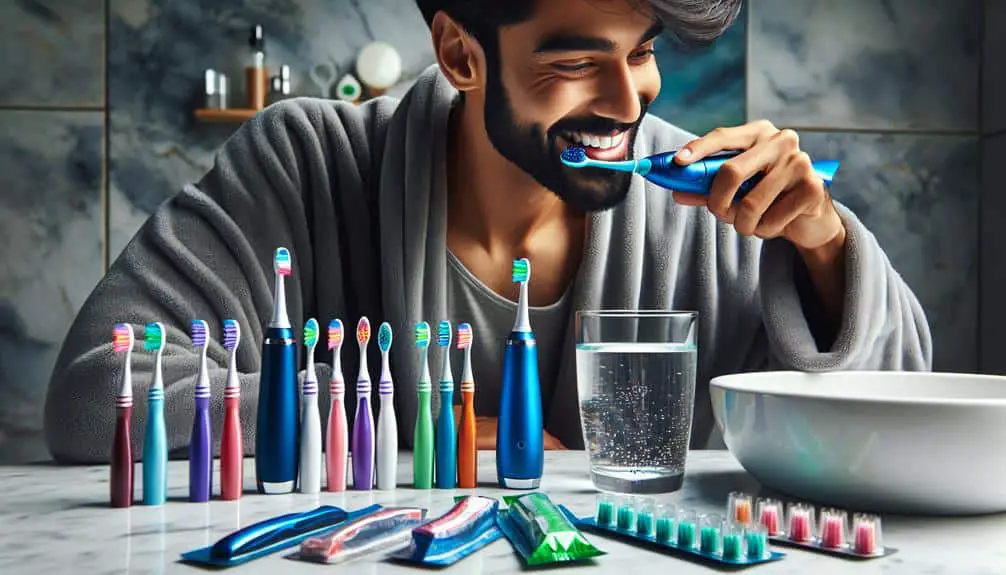For long-lasting teeth whitening, brush and floss daily using a soft-bristled toothbrush and fluoride toothpaste in gentle circles at a 45-degree angle. Avoid staining foods and beverages like coffee and red wine, and consider using straws. Schedule touch-up treatments every 6-12 months to combat discoloration. Use whitening toothpaste and mouthwash to remove stains and consult your dentist regularly for personalized care. Discover how these tips can enhance your whitening results by following expert advice on maintaining bright and healthy teeth!
Key Points
- Maintain good oral hygiene practices to prevent new stains.
- Avoid staining foods and beverages that can discolor teeth.
- Schedule regular touch-up treatments to refresh whitening effects.
- Use whitening toothpaste and mouthwash to maintain brightness.
- Consult your dentist regularly for personalized whitening options.
Proper Oral Hygiene Practices
To maintain long-lasting teeth whitening results, consistently follow proper oral hygiene practices such as brushing and flossing twice daily. Brushing methods are essential for removing plaque, bacteria, and food particles that can dull your smile. Use a soft-bristled toothbrush and fluoride toothpaste. Hold the brush at a 45-degree angle to your gums and move it in gentle circular motions. Make sure you brush all surfaces of your teeth, including the outer, inner, and chewing surfaces. Don't forget to brush your tongue to eliminate bacteria that can cause bad breath.
In addition to brushing, flossing benefits your teeth and gums by removing plaque and debris from areas your toothbrush can't reach. Break off about 18 inches of floss and wind most of it around one of your middle fingers. Hold the floss tightly between your thumbs and forefingers and gently guide it between your teeth using a back-and-forth motion. Curve the floss into a C shape against one tooth and carefully slide it beneath your gum line.
Consistent brushing methods and flossing benefits not only help maintain your teeth whitening results but also promote overall oral health.
Avoid Staining Foods and Beverages
Minimize the consumption of foods and beverages known to cause staining to help preserve your teeth whitening results for longer periods. Certain foods and drinks can undo the effects of whitening strips or professional bleaching treatments. Dark-colored beverages like coffee, tea, and red wine are notorious for staining teeth due to their high chromogen content. Acidic foods such as citrus fruits and tomatoes can also wear down enamel, making teeth more susceptible to staining. Berries, soy sauce, and balsamic vinegar are other culprits that can compromise your teeth whitening efforts.
To maintain your bright smile, consider using a straw when consuming staining beverages to minimize contact with your teeth. Rinse your mouth with water after eating foods that may stain to help reduce their impact. Additionally, brushing your teeth or chewing sugar-free gum after meals can help prevent stains from setting in. By being mindful of your diet and making small changes to avoid staining foods and beverages, you can prolong the results of your teeth whitening treatments.
Regular Touch-Up Treatments
Consider scheduling regular touch-up treatments to maintain the brightness of your smile and extend the longevity of your teeth whitening results. Whitening maintenance is essential to guarantee that your teeth retain their pearly white shine over time. Touch-up treatments can help combat the natural discoloration that occurs due to factors like diet, aging, and lifestyle habits.
Creating a touch-up schedule with your dentist will keep your smile looking radiant. Typically, touch-up treatments are recommended every 6-12 months, but this can vary based on individual needs and the whitening method used. By staying consistent with your touch-up schedule, you can prevent significant staining and keep your teeth looking their best.
During these touch-up appointments, your dentist may use professional-grade whitening products to refresh your smile effectively. These treatments are often quick and painless, providing a convenient way to maintain your desired level of whiteness. By following a regular touch-up schedule, you can enjoy a dazzling smile for years to come.
Use Whitening Toothpaste and Mouthwash
Enhance your teeth whitening routine by incorporating whitening toothpaste and mouthwash for a more vibrant smile. Whitening toothpaste contains abrasive particles or chemicals that help remove surface stains on your teeth, making them appear whiter over time. Look for toothpaste with the American Dental Association (ADA) Seal of Approval to guarantee its safety and effectiveness.
When selecting a whitening mouthwash, opt for one that helps prevent stains from sticking to your teeth. These mouthwashes often contain hydrogen peroxide or other whitening agents that can help maintain your smile's brightness between touch-up treatments. Remember, while whitening toothpaste and mouthwash can help improve your teeth whitening results, they're most effective when used in conjunction with other whitening methods such as whitening strips.
If you have any concerns about incorporating whitening toothpaste and mouthwash into your routine, consult your dental professional. They can provide personalized recommendations based on your oral health and help you achieve a whiter, brighter smile.
Consult Your Dentist Regularly
Regular consultations with your dentist are essential for maintaining peak oral health and monitoring the effectiveness of your teeth whitening routine. Your dentist can provide professional cleanings to remove stubborn stains and plaque that may be hindering the whitening process. These cleanings help prepare your teeth for further whitening treatments, ensuring better and longer-lasting results.
During your consultations, your dentist can also assess the condition of your teeth and gums, ensuring that the whitening trays you're using fit properly and aren't causing any harm. Your dentist can make necessary adjustments to your whitening routine to prevent sensitivity or damage to your teeth and gums.
Moreover, regular visits allow your dentist to track your progress and make recommendations based on your individual needs. They can suggest personalized whitening options or products that may work better for you, ultimately enhancing the longevity of your teeth whitening results. Remember, your dentist is your partner in achieving a bright and healthy smile, so don't underestimate the importance of regular check-ups.
Frequently Asked Questions
Can Teeth Whitening Cause Sensitivity or Damage to the Enamel?
To prevent sensitivity and protect enamel while whitening teeth, choose a reputable product, follow directions carefully, and consider using desensitizing toothpaste. Limit acidic foods and drinks, and consult your dentist for personalized advice on maintaining a healthy, white smile.
Are There Any Natural Remedies or DIY Methods for Whitening Teeth?
When it comes to natural remedies for teeth whitening, herbal options like baking soda and hydrogen peroxide have shown effectiveness. Additionally, oil pulling can provide benefits due to its antimicrobial properties. Incorporating these methods can aid in achieving a brighter smile.
How Long Does Teeth Whitening Typically Last Before Needing Touch-Up Treatments?
To maintain your teeth whitening long term, touch-up treatments typically become necessary every 6-12 months. Consistent oral hygiene, avoiding staining foods, and regular dental check-ups can help prolong the effects of your whitening treatment.
Are There Any Specific Foods or Beverages That Can Help Maintain Teeth Whitening Results?
To maintain teeth whitening results, incorporate whitening toothpaste into your daily routine. Enhance your diet with crunchy fruits and veggies, like apples and carrots, which can help scrub away stains. Avoid staining beverages for lasting brightness.
Can Certain Medical Conditions or Medications Affect the Effectiveness of Teeth Whitening Treatments?
Certain medical conditions or medications can impact the effectiveness of teeth whitening treatments. Always consult with your dentist to confirm treatment compatibility. Conditions like gum disease or medications that cause discoloration may affect results, so professional advice is essential.



